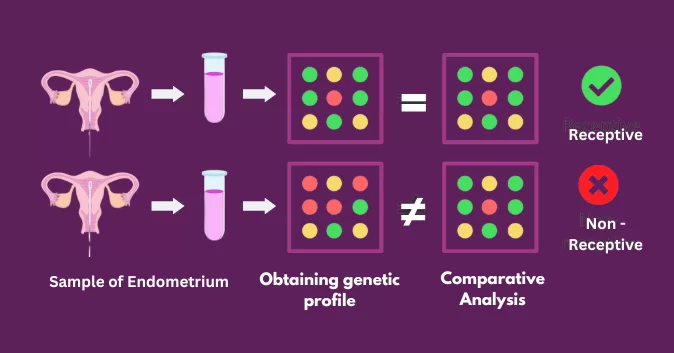ERA test-Endometrial receptivity array

What is the ERA Test?
- The Endometrial Receptivity Array (ERA) test is a molecular diagnostic tool used to
assess the receptivity of the endometrium (the lining of the uterus) to embryo
implantation.
Procedure:
- Endometrial Biopsy: A small sample of endometrial tissue is obtained through a
biopsy. This is typically performed during a mock or actual cycle. - Molecular Analysis: The biopsy sample is analyzed using advanced molecular
techniques to examine the expression levels of over 200 genes involved in
endometrial receptivity. - Personalized Window of Implantation: Based on the gene expression profile, the
test determines whether the endometrium is receptive at the time of biopsy. If it is
not, the test predicts the personalized WOI, indicating the best time for embryo
transfer in subsequent cycles.
Indications:
- Repeated IVF Failures: The ERA test is particularly useful for women who have
experienced multiple failed IVF cycles despite having good-quality embryos. - Unexplained Infertility: It helps identify cases where the endometrium may be out of
sync with embryo development, leading to implantation failure.
- Personalized Implantation Timing: Provides a tailored window of implantation for
each individual, optimizing the chances of embryo implantation. - Advanced Genetic Analysis: Utilizes state-of-the-art molecular diagnostic techniques
to evaluate endometrial gene expression. - High Accuracy: Offers a high level of accuracy in identifying the receptive state of the
endometrium. - Improved IVF Outcomes: Enhances the success rates of IVF by ensuring embryo
transfer occurs during the most receptive period of the endometrial cycle. - Non-Invasive: Involves a minimally invasive biopsy procedure that is well-tolerated
by most patients. - Repeatability: Can be repeated in subsequent cycles if necessary, providing flexibility
in treatment planning. - Comprehensive Report: Delivers a detailed report outlining the receptivity status and
recommended timing for embryo transfer. - Customizable Treatment Plans: Allows fertility specialists to create personalized
treatment plans based on individual endometrial receptivity profiles. - Reduced Implantation Failure: Aims to reduce the likelihood of implantation failure
and improve overall pregnancy rates. - Supportive Care: Accompanied by professional guidance and support throughout the
testing and treatment process.
Get a Call back
Need for help?
Feel free to call us anytime for your fertility problems, We are always there to help you out.
